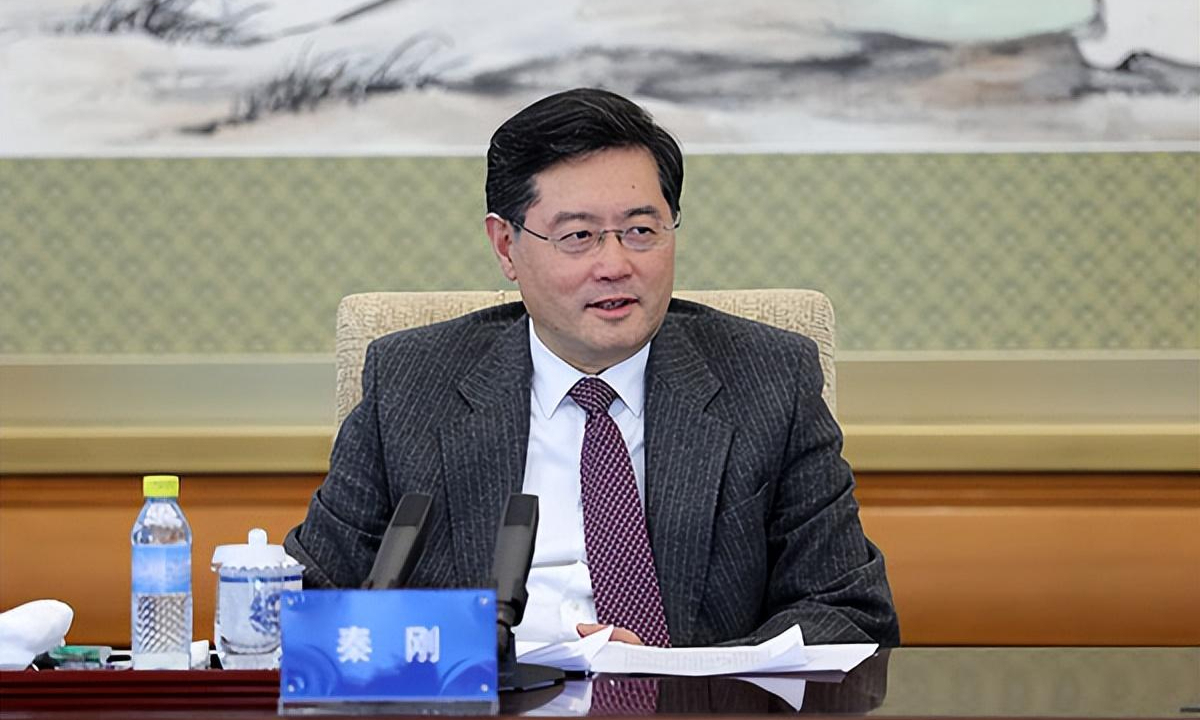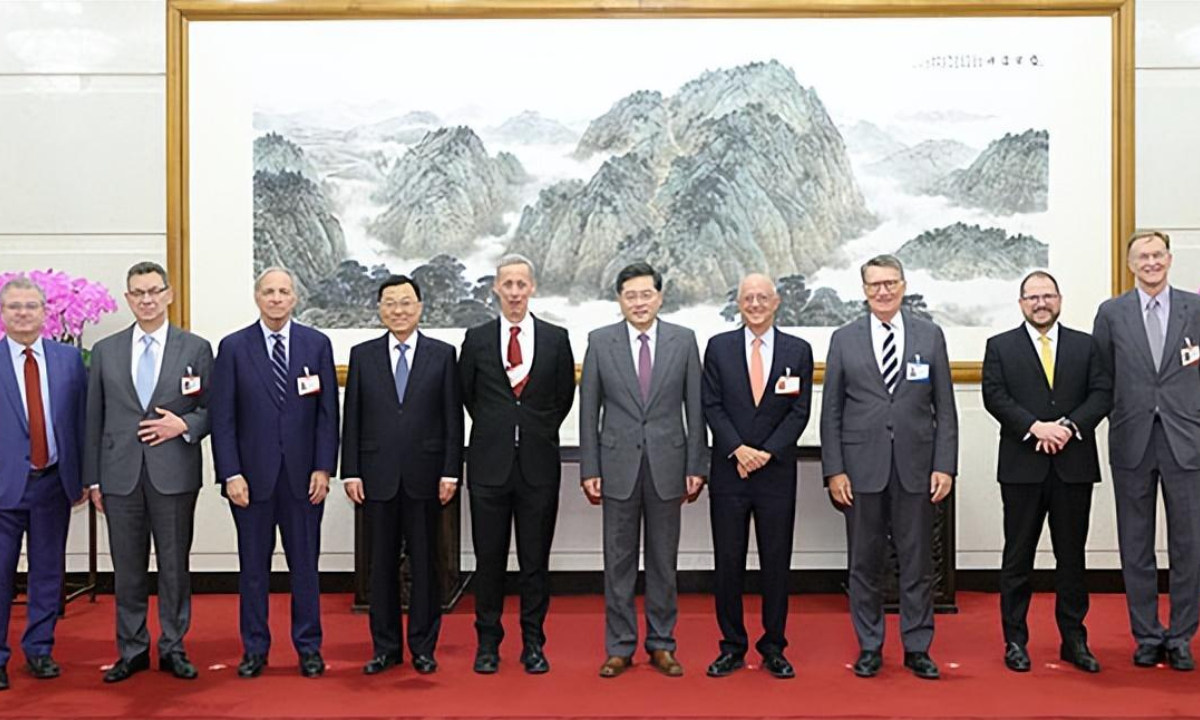
Photo: Ministry of Foreign Affairs
Chinese State Councilor and Foreign Minister Qin Gang welcomed a number of representatives from "friendly" US groups and business community to Beijing on Saturday, saying that US businesses are facing "triple benefits" in China, while expressing regret over "a cold spring" in China-US relations.
Many US and global business leaders and scholars are in Beijing for the China Development Forum (CDF), a major dialogue platform for Chinese officials, global business leaders and scholars, where many also called for increased cooperation and reduced tension between China and the US.
During the meeting with the US representatives, Qin said that China's major policies remain stable and consistent, China's doors open wider and wider, and China's economy and society have pressed a "restart button" and are ushering in a strong recovery, according to an official statement.
"These are triple benefits for the US business community," Qin said, "but regrettably, the current China-US relations are still in a cold spring."
Such remarks come as some in the US continue stubbornly to push for a "decoupling" with China, intensify crackdowns against Chinese businesses and step up pressure on allies and other countries to join in its containment of China.
In the latest example, the US government has repeatedly threatened to ban TikTok, a mobile app owned by Chinese firm ByteDance, and even force the firm to be sold to US buyers. The US Congress even held a hearing with TikTok's CEO on Thursday, which has been described a "
xenophobic witch hunt."
Also, during US President Joe Biden's visit to Canada from Thursday to Friday, the two sides repeatedly hyped China-related issues, prompting a harsh response from the
Chinese Embassy in Canada.
At the meeting on Saturday, Qin also said that "it is hoped that the US will abandon its zero-sum mentality, stop using unscrupulous means to contain and suppress China, and work with China to push China-US relations to overcome current difficulties and return to a healthy and stable track."
The Chinese Foreign Minister also told US representatives that China's attitude toward the development of a healthy, stable and constructive China-US relationship has not changed. It has always advocated mutual respect, peaceful coexistence and win-win cooperation between China and the US, he said.
At the CDF on Saturday, many US and global business leaders and scholars also called for lower tensions and greater cooperation, as they expressed enthusiasm over returning to China and seeking growth drivers unique to the world's second-largest economy.
Jeffrey D. Sachs, professor of Columbia University, said that the forum is crucial during "a point of tensions," and he is glad that business leaders were coming together.
"I hope that they go back to the US and tell the US government: calm down; we want to make peace, cooperation and business; we don't want conflict," Sachs told the Global Times on the sidelines of CDF on Saturday.
Prominent US business leaders such as Apple's Tim Cook, billionaire investor Ray Dalio, Cristiano Amon of US chip giant Qualcomm, Albert Bourla, CEO of Pfizer and Jon Moeller, CEO of consumer goods giant Procter & Gamble, were all in attendance.

Photo: Ministry of Foreign Affairs
"I'm thrilled to be back in China," Apple's CEO Tim Cook said
during a panel discussion, marking his first visit to China since the outbreak of the COVID-19 pandemic. "Every time I come to China, I learn stuff, I take something back with me. It's primarily about the culture."
In spite of the US government's litany of attempts to undermine bilateral ties, business cooperation, especially US businesses' operations in China, is growing.
"Despite challenges, cooperation between American companies and their Chinese counterparts are extremely resilient," Craig Allen, president of the US-China Business Council, told a panel at the CDF on Saturday.
US exports to China reached record highs in 2022, and China remains a crucial destination for US agriculture, food, chemical exporters, and other commodities, he said, adding USCBC data suggest that about one million Americans are employed as a result of exports to China.
Aside from trade, US investment in China is also very important, and 77 percent of goods produced by US companies is sold within the local market and only 7 percent is exported back to the US, Allen said.
And Chinese officials are further extending a welcome to foreign businesses to invest in China.
"We welcome companies from all over the world to invest in China, and we also expect foreign entrepreneurs to adopt a long-term vision. By investing in China, you can 'throw a long line and catch big fish'," Han Wenxiu, executive deputy director of the office of the Central Committee for Financial and Economic Affairs, said at the CDF on Saturday.
With a theme of "Economic Recovery: Opportunities and Cooperation," the event marks the first time the annual meeting has been held offline since the outbreak of the COVID-19 epidemic.
More than 100 overseas multinationals, leaders of international organizations and well-known scholars are attending the CDF. Officials from the Chinese central government, including more than 30 ministerial-level officials, will introduce China's policy orientation at the forum, event organizers revealed.
As the first national-level large-scale international forum following China's annual two sessions, CDF is being viewed as an opportunity to promote China's economic policies to the world and shore up confidence across the global economy, Kang Yong, chief economist at KPMG China, told the Global Times on the sidelines of the forum.
China will continue to contribute its wisdom and strength to promote the recovery and development of the global economy, insist on in-depth trade, technology and industrial cooperation with other countries, while seeking to inject vitality, and promote high-quality development throughout the world, Kang said.





